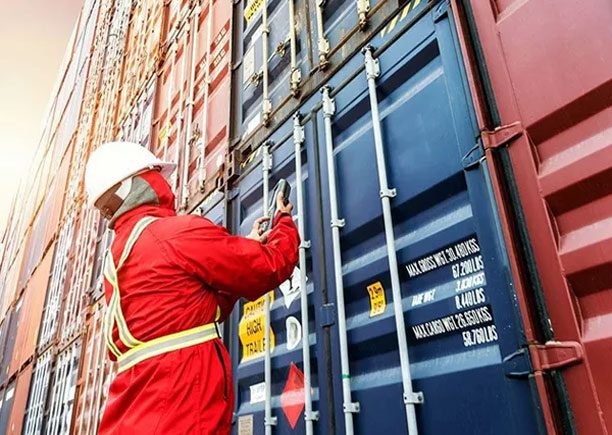EXPORT CLEARANCE
- Home
- EXPORT CLEARANCE
Streamline Your Exports: OLC Shipping Line's Expert Clearance Services
Is export clearance slowing down your business? Let OLC Shipping Line handle the complexities, ensuring your goods reach global markets efficiently and on time. We offer comprehensive export clearance services designed to simplify international trade and minimize delays.
Our Expertise: Your Advantage
OLC Shipping Line possesses extensive experience navigating the intricate world of international trade regulations. Our team of expert customs brokers understands the specific requirements of various countries, allowing us to:
- Ensure Compliance: We meticulously prepare all necessary documentation and ensure your shipment adheres to all applicable customs regulations, avoiding costly delays and penalties.
- Expedite Clearance: Our established relationships with customs authorities help expedite the clearance process, getting your goods to their destination faster.
- Minimize Risk: We identify and mitigate potential risks throughout the entire export process, protecting your valuable cargo and your bottom line.
Our Comprehensive Export Clearance Services Include:
- Documentation Preparation: Accurate and complete documentation is crucial. We handle everything from commercial invoices and packing lists to certificates of origin and bills of lading.
- Customs Brokerage: Our experienced brokers act as your liaison with customs authorities, ensuring smooth and efficient clearance.
- Pre-Shipment Inspections: We can arrange for pre-shipment inspections to ensure your goods meet quality and regulatory standards.
- Cargo Insurance: Protect your investment with our comprehensive cargo insurance options.
- Port Handling and Logistics: We manage the entire port process, from arrival to loading onto the vessel.
- Real-time Tracking: Monitor your shipment’s progress with our online tracking system.

Why Choose OLC Shipping Line?
- Years of Experience: We have a proven track record of successfully navigating export clearance complexities.
- Cost-Effective Solutions: We offer competitive pricing without compromising quality or efficiency.
- Dedicated Support: Our team provides personalized support throughout the entire process.
- Transparent Communication: We keep you informed every step of the way, providing regular updates and proactive problem-solving.
- Global Reach: We handle exports to destinations worldwide.
Ready to Simplify Your Exports?
Stop letting export clearance bottlenecks hinder your growth. Contact OLC Shipping Line today for a consultation and let our expertise work for you. Get a free quote and experience the difference seamless export clearance can make to your bottom line.
FAQs
How long does the export clearance process typically take?
Typically, it takes 1 to 3 days. However, factors like destination and documentation accuracy can affect timelines. Moreover, customs workload and automation play a role. Therefore, preparing well in advance ensures faster clearance.
Are there any specific regulations for different countries in export clearance?
Yes, each country has its own specific export regulations. These can include product restrictions, documentation requirements, labeling rules, and compliance standards. For example, some countries may have stricter customs inspections or require specific licenses for certain goods. Therefore, it’s crucial to research the destination country’s rules to avoid delays or penalties.
How much does export clearance cost, and how are the fees determined?
Export clearance costs vary depending on factors like shipment type, destination, and service provider. Fees typically include duties, taxes, handling charges, and customs brokerage fees. Additionally, the value and nature of the goods can influence costs. For accurate pricing, it’s important to consult with your logistics partner or customs broker.
How can I track my shipment during the export clearance process?
You can track your shipment during the export clearance process using tracking tools provided by your logistics partner or customs agency. These platforms offer real-time updates on the status of your shipment, including its location and clearance progress. Additionally, you can contact your customs broker for further assistance if needed.
What happens if my goods fail the customs inspection?
If your goods fail the customs inspection, they may be held for further review, leading to delays. You could face additional inspection fees, fines, or penalties. In some cases, the goods may be re-exported or seized. To resolve the issue, take prompt corrective action, such as providing the correct documentation or addressing compliance issues.